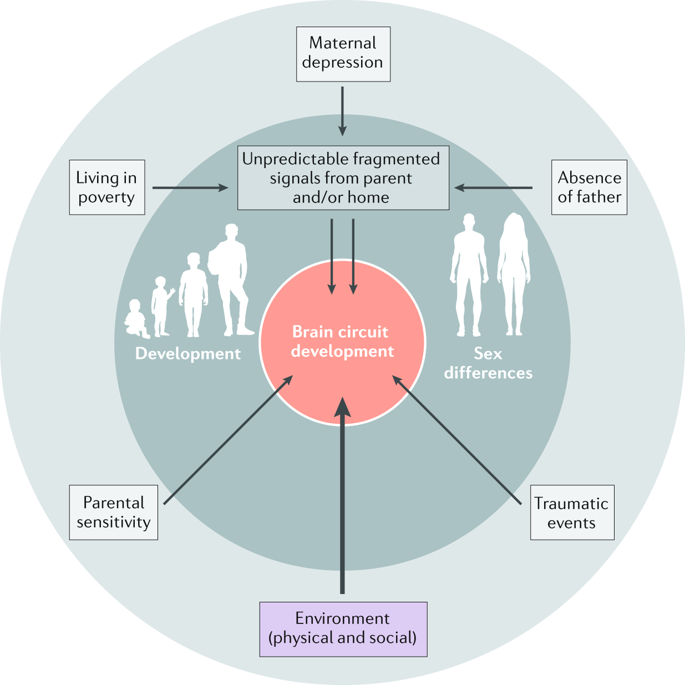当前位置:
X-MOL 学术
›
Nat. Rev. Neurol.
›
论文详情
Our official English website, www.x-mol.net, welcomes your
feedback! (Note: you will need to create a separate account there.)
Early-life adversity and neurological disease: age-old questions and novel answers.
Nature Reviews Neurology ( IF 28.2 ) Pub Date : 2019-09-17 , DOI: 10.1038/s41582-019-0246-5 Annabel K Short 1, 2 , Tallie Z Baram 1, 2, 3
Nature Reviews Neurology ( IF 28.2 ) Pub Date : 2019-09-17 , DOI: 10.1038/s41582-019-0246-5 Annabel K Short 1, 2 , Tallie Z Baram 1, 2, 3
Affiliation

|
Neurological illnesses, including cognitive impairment, memory decline and dementia, affect over 50 million people worldwide, imposing a substantial burden on individuals and society. These disorders arise from a combination of genetic, environmental and experiential factors, with the latter two factors having the greatest impact during sensitive periods in development. In this Review, we focus on the contribution of adverse early-life experiences to aberrant brain maturation, which might underlie vulnerability to cognitive brain disorders. Specifically, we draw on recent robust discoveries from diverse disciplines, encompassing human studies and experimental models. These discoveries suggest that early-life adversity, especially in the perinatal period, influences the maturation of brain circuits involved in cognition. Importantly, new findings suggest that fragmented and unpredictable environmental and parental signals comprise a novel potent type of adversity, which contributes to subsequent vulnerabilities to cognitive illnesses via mechanisms involving disordered maturation of brain 'wiring'.
中文翻译:

早年逆境和神经系统疾病:古老的问题和新颖的答案。
神经系统疾病,包括认知障碍、记忆力下降和痴呆症,影响着全球超过 5000 万人,给个人和社会带来沉重负担。这些疾病是由遗传、环境和经验因素共同造成的,其中后两个因素在发育敏感期影响最大。在这篇综述中,我们重点关注不良的早期生活经历对大脑异常成熟的影响,这可能是易患认知性大脑疾病的基础。具体来说,我们借鉴了不同学科的最新重大发现,包括人体研究和实验模型。这些发现表明,生命早期的逆境,尤其是围产期的逆境,会影响参与认知的大脑回路的成熟。重要的是,新的发现表明,支离破碎且不可预测的环境和父母信号构成了一种新型的有效逆境,这种逆境通过涉及大脑“线路”成熟障碍的机制,导致随后易患认知疾病。
更新日期:2019-09-18
中文翻译:

早年逆境和神经系统疾病:古老的问题和新颖的答案。
神经系统疾病,包括认知障碍、记忆力下降和痴呆症,影响着全球超过 5000 万人,给个人和社会带来沉重负担。这些疾病是由遗传、环境和经验因素共同造成的,其中后两个因素在发育敏感期影响最大。在这篇综述中,我们重点关注不良的早期生活经历对大脑异常成熟的影响,这可能是易患认知性大脑疾病的基础。具体来说,我们借鉴了不同学科的最新重大发现,包括人体研究和实验模型。这些发现表明,生命早期的逆境,尤其是围产期的逆境,会影响参与认知的大脑回路的成熟。重要的是,新的发现表明,支离破碎且不可预测的环境和父母信号构成了一种新型的有效逆境,这种逆境通过涉及大脑“线路”成熟障碍的机制,导致随后易患认知疾病。











































 京公网安备 11010802027423号
京公网安备 11010802027423号